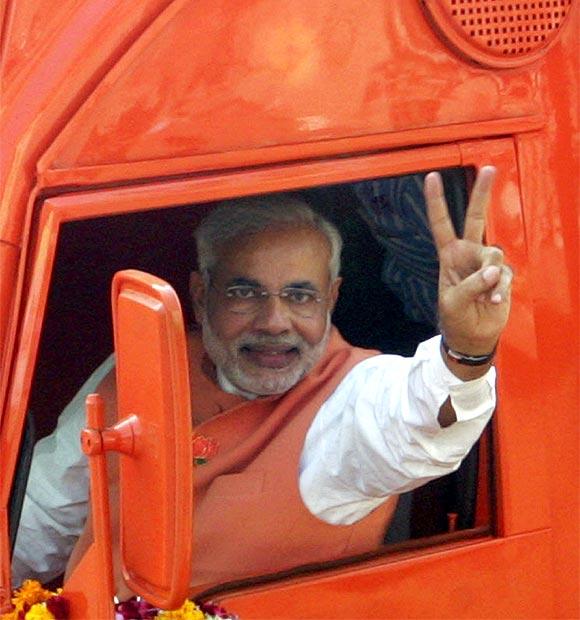 | « Back to article | Print this article |
 Dharmendra Kumar Singh explains the importance of getting 28 percent of the vote in Uttar Pradesh, which is witnessing a five-cornered contest.
Dharmendra Kumar Singh explains the importance of getting 28 percent of the vote in Uttar Pradesh, which is witnessing a five-cornered contest.
The sixth phase of the general elections has ended but the suspense over Uttar Pradesh’s result is not over. Many experts are excitedly predicting a Bharatiya Janata Party sweep here.
It is being argued that the BJP prime ministerial candidate Narendra Modi’s nomination from Varanasi has so electrified the voters that the party could win more than 50 seats out of 80 seats. Uttar Pradesh is a state where it difficult to predict winners when five parties are in fray. The split of votes may change the fortunes of a party and may even prove to be a spoiler for others.
In UP, the Congress failed to open its account in the 1977 and 1998 elections but the party scored a landslide winning 83 out of 85 seats in 1984. The BJP also performed very well from 1991 to 1998 but its strength has been decreasing since the 1999 Lok Sabha election.
This election is not only about arithmetic but about the chemistry on the ground. The five different ingredients in Uttar Pradesh’s political lab may produce oxygen for a particular party and poison for others. Projecting seats for Uttar Pradesh is not only science but also art.
Which castes and religion will go in which direction is unpredictable. Religion and caste play a major role in Uttar Pradesh. Even how Muslims, who constitute 18 percent of the population, are going to vote in this election is not clear.
The fate of the state’s 80 Lok Sabha seats depend on four M’s -- Modi, Mulayam, Muslim and Mayawati. Muslim voters may spoil two M’s but make one of the M’s stronger that is why each party has worked meticulously during ticket distribution in the state.
The BJP has fielded 25 OBCs, 17 Brahmins, 14 Thakurs, 17 Dalits, 3 Vaishays and one Pasi and Bhumihar each while 2 seats were given to Apna Dal. It means 27 tickets were given to OBC candidates if the Apna Dal is included. Interestingly, the BJP has always fought for 50 percent of the total votes since the remaining have traditionally never voted for the BJP.
This includes Muslims, Yadavs and Dalits. The BJP performed the best in the 1998 election scoring 36 percent votes and bagged 52 seats out of 80 seats. It seems the party that will get more than 28 percent votes will prove to be number one. If it crosses 30 percent, it may cross 40 seats.
The BJP is expected to perform very well but how many seats they will get is not clear. The BJP’s winning equation seems to be the upper castes, a section of the OBCs and Dalits, which is why the BJP has not fielded single Muslim candidate.
The stark reality is that caste and religion are the deciding factor in state politics. Mayawati has given weightage to Brahmins and Muslims candidates. Her Bahujan Samaj Party has given tickets to 21 Brahmins, 19 Muslims, 17 Dalits, 15 OBCs and 8 Thakurs. Everyone understands the ticket distribution game of Maywati. If three dominant castes and religions are added, the constitute 51 percent of the vote. Questions arise whether a majority of Muslims and Brahmins will vote for Mayawati. If Muslim voters go in favour of the BSP, the scenario will be changed drastically if not then Muslims votes will be fragmented. If Muslims vote for Mayawati’s share may touch 40 percent but it seems unlikely. The changes in the pattern of the BSP’s ticket distribution in UP reflect these objectives. BSP is focusing on Dalit-Muslim-Brahmin combination.
Mulayam Singh Yadav is not far behind in the caste and religion game. The Samajwadi Party has distributed 78 tickets so far -- amongst the 30 OBCs, 18 Brahmins and Thakurs, 13 Muslims and 17 Dalits. One can easily understand the politics of party and inclination of caste and religion. The SP is trying to forge an OBC-Muslim-Brahmin combination but due to the Muzzaffarnagar riots, Muslims voters are annoyed with the party.
The Congress has fielded 67 candidates out of 80 seats and the rest have been given to Ajit Singh’s Rashtriya Lok Dal. The Congress has 14 Dalits, 13 Brahmins, 11 Muslim, 10 Vaishyas, 9 OBCs, one each Jain, Kayastha and Bhumihar.
The Aam Aadmi Party is also in the fray and may be spoiler if it gets some Muslim votes.
It seems no party has crossed 28 percent votes except the BJP since 1991 election. So 28 percent is the deciding factor. If anyone crosses 35 percent of votes will be a tsunami in state politics.
Dharmendra Kumar Singh is a political analyst.